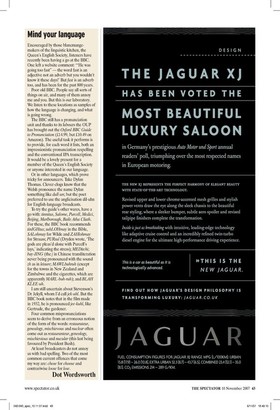Mind your language
Encouraged by those blancmangemakers of the linguistic kitchen, the Queen's English Society, listeners have recently been having a go at the BBC. One left a website comment: "Ile was going too fast" — the word fast is an adjective not an adverb but you wouldn't know it these days!' But fast is an adverb too, and has been for the past 800 years.
Poor old BBC. People say all sorts of things on air, and many of them annoy me and you. But this is our laboratory. We listen to these locutions as samples of how the language is changing, and what is going wrong.
The BBC still has a pronunciation unit and thanks to its labours the OUP has brought out the Oxford BBC Guide to Pronunciation (£14.99, but £10.49 on Amazon). The useful task it performs is to provide, for each word it lists, both an impressionistic pronunciation respelling and the conventional IPA transcription. It would be a lovely present for a member of the Queen's English Society or anyone interested in our language.
Or in other languages, which prove tricky for announcers. Take Dylan Thomas. Clever-clogs know that the Welsh pronounce the name Dylan something like dull-un; but the poet preferred to use the anglicisation dil-uhn for English-language broadcasts.
To try the guide's other wares, have a go with: tinnitus, Salome, Purcell, Medici, Beijing, Marlborough, Baile Atha Cliath. For these, the BBC book recommends tinIGHtus; suhLOHmay in the Bible, SALohmay for Wilde and ZAHlohmay for Strauss; PURsul (Dryden wrote, 'The gods are pleas'd alone with Purcell's lays,' indicating the stress); MEDitchi; bay -JING (the] in Chinese transliteration never being pronounced with the sound zh as in leisure; MAWLbuluith (except for the towns in New Zealand and Zimbabwe and the cigarettes, which are apparently MARL-buh-mh); and BLAH KLEE-uh.
I am still uncertain about Stevenson's Dr Jekyll, whom I'd call jek-uhl. But the BBC book notes that in the film made in 1932, he is pronounced jee-lachl, like Gertrude, the gardener.
Four common mispronunciations seem to derive from an erroneous notion of the form of the words: restaurateur, genealogy, mischievous and nuclear often come out as restauranteur, geneology, mischievious and nucular (this last being favoured by President Bush).
At least broadcasters do not annoy us with bad spelling. Two of the most common current offences that come my way are: chose for choose and contrariwise loose for lose.
Dot Wordsworth





































































 Previous page
Previous page